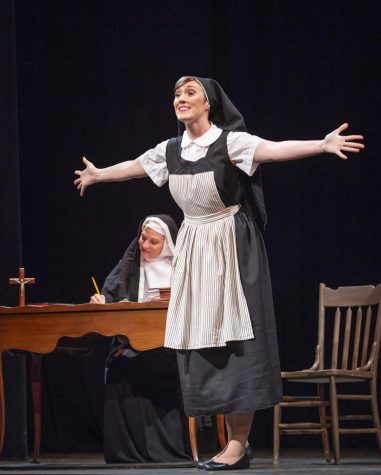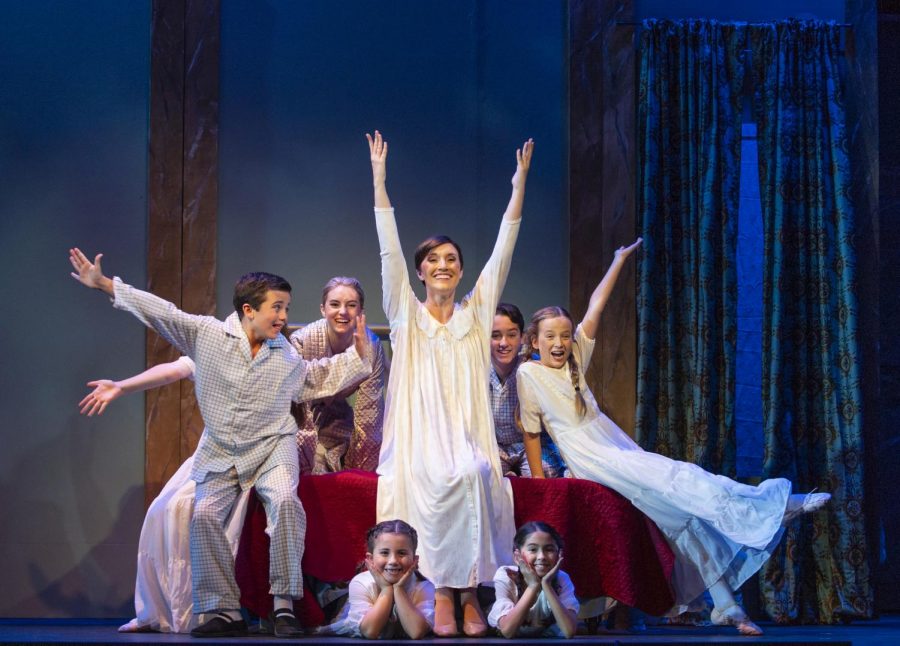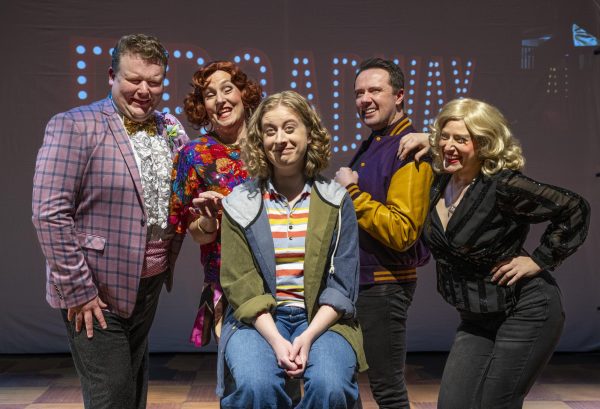Review: “Sound of Music” the Musical
Maria (center – Jillian Bader) and the von Trapp children (clockwise from left: Billy Hutton, Madison Colgate, Jake Miller, Anna Savage, Jane Quiazon, Mary Hutton) all sing together to forget their fear of the thunder.
What unites the theater? Maybe the lights that dance on actors’ faces? Maybe the magic that flows out the orchestra pit? Or maybe the atmosphere itself created specifically for the audience? Nearly every aspect of theatrical performance fits perfectly into the play The Sound of Music.
On the evening of July 20, the award winning Foothill Music Theatre brought the classic musical to life. Directed by Milissa Carey, the production artfully told the story of the Von Trapp family: a governess, an overly strict father, and his seven children. The play intelligently weaved together the narratives of several different characters, as well as the range of conflicts they faced. Set in 1939, the plot forces characters to first grapple with their own problems, and then with the oppressive pressure of the Third Reich. As empathy and love builds in the budding family, so does their increasing fear, anger, and need to escape.
The Sound of Music has always been a play for families, and the audience filling the Smithwick Theater reflected that. Both adults and children eagerly packed the hall for a production that has never carried an age limit. The play itself was divided into two acts, during which the actors consistently performed and sung admirably.
Jillian Bader played the role of Maria Rainer. She was a versatile actor who managed to display the depth of Maria’s identity — from her joyous demeanor to her respectable persistence in all elements of her life. Though she held the role of the main character, the children were also applauded by the audience. Gretl, the youngest member of the family, was played exceptionally well by Mary Hutton and Alyssa Kim, who both showcased the girl’s innocence and simplicity.
The musical was, of course, full of memorable music. “The Lonely Goatherd,” was brilliantly sung by Bader during the iconic thunderstorm scene — filled with lyrics to cheer the frightened Von Trapp children up. Liesl, played by Madison Colgate, sung along to “Sixteen going on Seventeen,” a famous song from the production. The song “Something Good” was a wonderful highlight to the heartfelt declaration of love between Maria and Captain Von Trapp. The tunes, directed by William Liberatore and choreographed by Brett and C.J. Blankenship, served as simple motifs, allowing particular scenes to stand out among the rest. They all brought on loud applause.

Mother Abbess, played by Rachel Michelberg, listens as Maria, played by Jillian Bader, gushes about the wonders of life.
Though the actors and music carried the attention of viewers, technical aspects of the production were anything but neglected. For example, lighting. In the abbey scenes where Maria returned to Mother Abbess for advice, the main spotlights brightly illuminated the actors, and the background was dark; but, in the living room of Von Trapp’s villa, everything was brightly lit. The lighting itself carved out the difference in mood, and made it all the more apparent how Maria felt in either scene.
The musical brimmed with memorable moments. All of the scenes involving children were so fun and innocent, the viewers couldn’t stay serious. The wedding of Maria and Captain Von Trapp captured the room, and was incredibly emotional. The final scene of the breathtaking ascension to the mountain so amazed the audience that there was not a single rustle in the hall.
One could bring home any number of ideas from such a rich play. Some may see the importance of music. Some may see the danger of political differences. But one idea was made clear to all by the end of the play: family unity is the most powerful force in the world.
The Sound of Music will be playing every Thursday, Friday, Saturday, and Sunday night till August 5. It will play at 7:30 p.m. on Thursdays, 8 p.m. on Fridays and Saturdays, and 2 p.m. on Sundays. Performances are held at the Smithwick theater, and tickets can be purchased online.
































































































